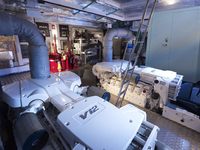Panic Room welcomes policy shift on armed guards for commercial vessels

David Cameron will legalise armed guards on British-registered ships at threat from Somali pirates. Speaking on BBC’s Andrew Marr Show on Sunday, the Prime Minister said he would reverse Britain’s existing stance which opposes the use of weapons aboard ships and pledged that the new rules would be in place within a month. UK-based the Panic Room Company welcomes the news.
Steve Brook, Business Development Director of the Panic Room Company, comments, “A significant proportion of the interest we’ve received from exhibiting our Panic Rooms in Europe and Africa has been from the commercial shipping industry. Attacks from Somali pirates are on the up and ship owners have no choice but to ramp up their onboard security. Private armed guards make good sense, particularly if used in conjunction with our portable Panic Rooms that will not only protect personnel as a last point of defence but also serve as secure impenetrable arms stores.”
In 2010 there were 489 acts of piracy or armed robbery against ships, an increase on the previous year, and watchdog Ecoterra stated last month that Somali pirates are currently holding 50 ships and 528 hostages. Under Cameron’s proposal, British-flagged vessels will be permitted to carry armed guards on the most hazardous shipping routes, most notably off the coast of Somalia where 49 of the world’s 53 hijackings took place in 2010. Around 20% of world trade passes through the Gulf of Aden between Yemen and Somalia to reach the Suez Canal which communicates the Mediterranean to the Red Sea and ultimately the Atlantic to the Indian Ocean.
Statistics show that no ship carrying armed security has yet been hijacked highlighting the importance of the Prime Minister’s proposed measures. Cameron told the BBC, “The fact that a bunch of pirates in Somalia are managing to hold to ransom the rest of the world and our trading system is a complete insult”. Whilst most hijackings tend to be over without taking casualties as soon as a ransom is paid, the process can take many months. The practice is also a huge drain on the global economy with maritime piracy costing up to 12 billion dollars in 2010 with Somalia-based pirates accounting for 95% of that figure.
About the Panic Room Company - Produced in consultation with senior military experts and police, the Panic Room is a safe, sustainable refuge as a last point of defence and can be specified to withstand mechanical attacks, shotgun fire and more powerful weapon attacks. Each unit can be connected to complementary devices such as a simple ‘panic button’, iPad-2 technology using ISDN or 3G to contact external help or a bespoke computer system able to drive smoke screens or security cameras. The unit can be disguised to unobtrusively blend in with any environment and, although the time spent within is likely to be minimal, the Panic Room is comfortable and sustainable with external ventilation and air filtration, breathing equipment, lighting, back-up power supplies, fresh water and basic toilets all part of the concept.
For more information, visit thepanicroomcompany.com.

